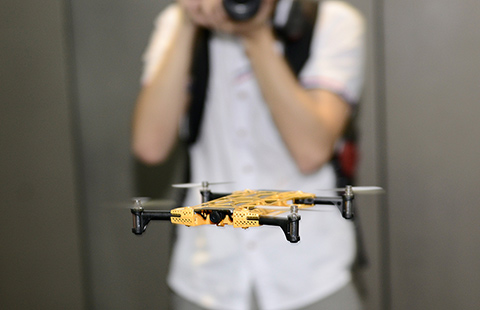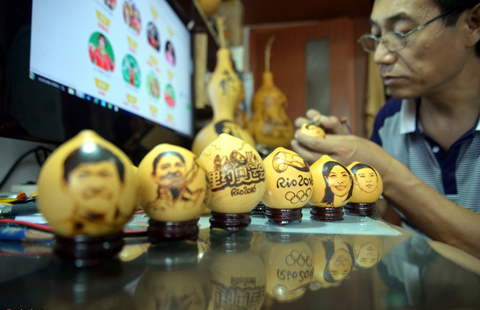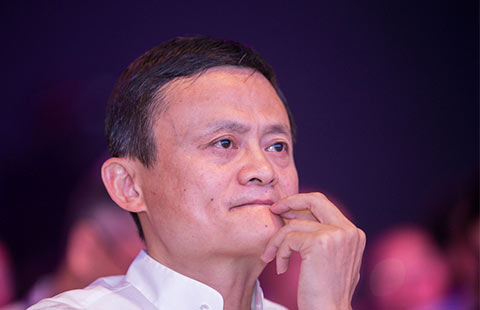Apple mulls R&D center
By MA SI (China Daily) Updated: 2016-08-17 07:06
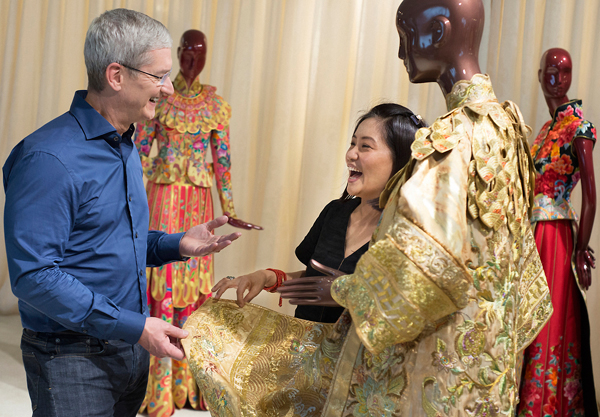 |
|
Tim Cook, CEO of Apple Inc, talks with Chinese fashion designer Guo Pei on August 15, 2016 in Beijing. TIM COOK'S WEIBO |
Move part of effort to regain market share lost to local rivals
Apple Inc will set up a research and development center in China by the end of this year-its first independently-operated one in the Asia-Pacific region-as part of its efforts to regain market share it is losing to local rivals.
Apple CEO Tim Cook said on Tuesday that the US tech giant would step up its investments in China and be an active part in promoting the country's smart manufacturing and Internet Plus strategy, which are designed to advance the use of the internet in traditional industries.
Cook revealed the company's plan during a meeting with Vice-Premier Zhang Gaoli. Cook's second visit to Beijing within three months highlighted the importance of the Chinese market where the tech giant is wrestling with declining iPhone sales.
The company did not disclose the investment size for the new R&D center.
"We look forward to expanding our operations in China with a new research and development center as we continue to grow our talented team here," Apple said in a written statement to China Daily.
According to the company, the center will bring together its engineering and operations teams in China so as to develop advanced technologies and services for its customers in the country and around the world.
"The new center is also aimed at strengthening relationships with local partners and universities as we work to support talent development across the country," the company said.
Apple currently operates 42 retail stores around the Greater China region. As of last October, the company had 10,000 working directly for it in China.
In a separate app developer event on Tuesday, Cook said his company would add more China-specific features to its mobile operating system, in a move to further differentiate its products.
The move comes as smartphones increasingly look and work the same, and services and software become increasingly important to help companies differentiate their products and win brand loyalty.
Currently, Apple's intelligent personal assistant Siri is learning ancient Chinese poems and when Chinese consumers speak some of their words, Siri will be able to recognize which poems they are from and tell users the names of the poets.
During his latest visits to China, Cook had extensive meetings with local developers, highlighting his emphasis on offering better services.
James Yan, research director at Counterpoint Technology Market Research, said: "Smartphone hardware is no longer Apple's edge, because local vendors such as Huawei Technologies Co Ltd are catching up quickly, and even outdoing Apple in hardware components, such as having dual cameras on one smartphone," Yan said.
In May, Cook said his company would speed up its efforts to let Chinese-developed mobile applications go global, as local developers raked in earnings exceeding $7 billion from the company's App Store.
Cook's visit also came ahead of the company's new iPhone launch, which will take place in the fall and is widely seen as the key to helping Apple regain its crown in China.
Jin Di, research manager at International Data Corp China, said during the visit Cook would probably discuss cooperation deals with retail partners, including telecom carriers.
"While local vendors all saw year-on-year growth in China in the second quarter, Apple continued to decline in its shipment volumes," Jin said.
Liu Zheng contributed to the story.
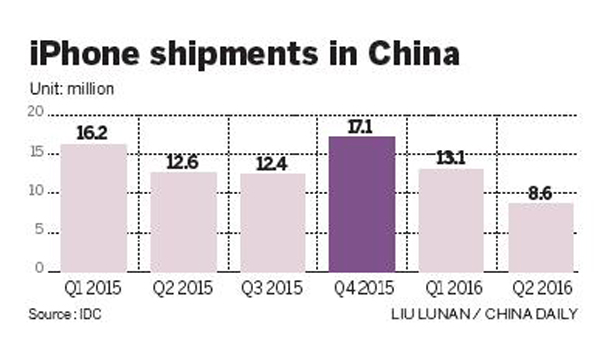
- Dealers recall nearly 7,000 Japanese autos in China
- HiScene aims HiAR in fight with Microsoft glasses
- Praxair 'held' merger talks with Linde
- Gogo in-flight Wi-Fi service ready for takeoff on China flights
- Shenzhen and HK bourse link approved
- Sunny Chinese have an eye for fashion
- Innovation drive beefs up nation's global ranking
- Vanke surges once more as Evergrande increases stake



